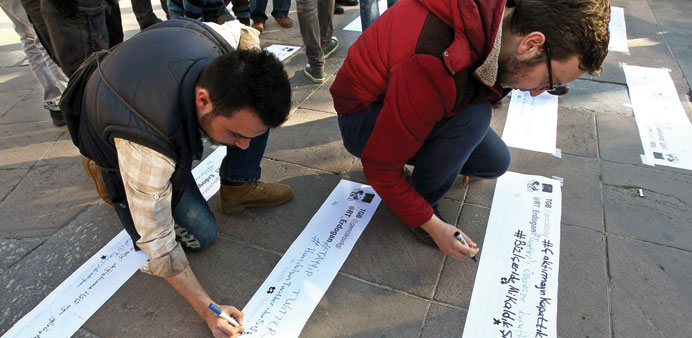AFP/Reuters/Ankara
Turkey’s government has defended its internationally-condemned ban on Twitter as a “preventive measure” to stop “character assassinations” following a wave of corruption investigation leaks.
“Twitter has been used as a means to carry out systematic character assassinations by circulating illegally acquired recordings, fake and fabricated records of wiretapping,” the office of Prime Minister Recep Tayyip Erdogan said in a statement sent to AFP in English.
The statement added that the government has “always valued the Internet and its accompanying opportunities” but drew the line at “the free circulation of the illegally acquired recordings ... which aim at hampering national security”.
It also claimed international precedents, including Germany’s decision to ban a neo-Nazi Twitter account in October.
Turkey blocked access to Twitter on Thursday after Erdogan, whose government is engulfed in a vast corruption scandal, defiantly vowed to “wipe out” the messaging service.
However, a senior Turkish government official told Reuters that talks with the social media company on resolving problems which led to the block were going positively.
The site remained blocked in Turkey yesterday. Those trying to access it found an Internet page carrying court rulings saying it had been blocked as a “protection measure”.
Many Turks reported difficulties in accessing not just Twitter but the Internet as a whole, according to media reports and comments on social media.
The Turkish government began talks with Twitter on Friday, saying that the ban would be lifted if the San Francisco-based firm appointed a representative in Turkey and agreed to block specific content when requested by Turkish courts.
“The talks are continuing in Ankara and the process is going positively. The biggest problem with Twitter until now has been the lack of contact and that has been resolved,” the senior government official told Reuters.
He said one of the accounts to which Ankara objected had been closed and talks on others were continuing, but that it was too early to say when a solution would be reached.
Turkish media reports said the closed account had contained pornographic material and did not refer to any link to the graft scandal.
Erdogan, who has been in power since 2003, has also threatened to ban YouTube and Facebook after crucial local elections on March 30, seen as a crucial gauge of how much damage his government has suffered from the corruption leaks and anti-government protests.
The Turkish government said that the ban was put in place only after Twitter refused to abide by “hundreds of court rulings” since January ordering the removal of content deemed illegal.
“It is difficult to comprehend Twitter’s indifference, and its biased and prejudiced stance; we believe that this attitude is damaging to (Twitter) and creates an unfair and inaccurate impression of our country,” the statement read.
Ankara urged Twitter and other social networking sites to respect the principle that “whatever is crime in real life is also a crime in cybernet”.
Critics see the ban as a desperate attempt by Erdogan to stem the flow of damaging revelations that have engulfed his inner circle since the corruption investigation went public in December.
New leaks have surfaced almost daily.
Some of the most damaging have come from two Twitter accounts under the names Haramzadeler (“Sons of Thieves”) and Bascalan (“Prime Thief”) that appear to have access to a huge trove of secret documents and police wiretaps linked to the probe.
Recordings have allegedly caught Erdogan talking with his son about disguising vast sums of money, as well as interfering in business deals, court cases, media coverage and the sale of prime property in Istanbul.
Erdogan has fiercely rejected the corruption allegations and dismissed most of the recordings as “vile” fakes concocted by political rivals.
Turkey’s clampdown on Twitter sparked outrage and defiance worldwide, with the United States on Friday describing the move as “contrary to Turkey’s own expressed desire to be a model of democracy”.
Far from curtailing the use of Twitter, however, the ban led to a huge surge in tweets, with angered Turks using virtual private networks (VPNs) and changing Domain Name Systems to get round the restrictions.
Twitter also reminded users they could still get onto the platform through SMS text messaging.
Figures from Brandwatch, a social media monitoring agency, showed tweets in Turkey increased by 138% after the ban, compared with the day before.
“I am happy to be on Twitter ... I’ve become a Twitter user at the age of 83 in order to penetrate bans,” Twitter handle @NejlaKoker wrote.
According to unconfirmed reports, the government was responding by trying to block access to lists of alternative DNS numbers.
“Government’s war on Twitter continues with blocking access to Google DNS server addresses from Turkey,” Yaman Akdeniz, a professor of cyberlaw at Istanbul’s Bilgi University, wrote on Twitter.

